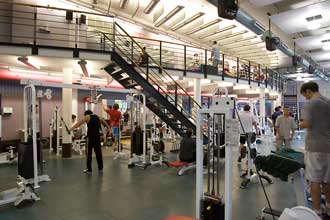
Athletics and Recreation offers fitness feast to satisfy all tastes
By Neale McDevitt
With its emphasis on academic excellence, McGill is as a place that cultivates great minds. As such, each September is marked by students hunkering down for long hours studying, faculty members preparing course and lab work, and staff supporting the whole enterprise in a myriad of ways. On your mark. Get set. Think.
But what about the body?
Ironically, when the figurative starter’s pistol sounds to mark the beginning of each semester, one of the elements that’s often left in the blocks is the actual running, or swimming, or lifting.
“Thirty minutes a day of physical activity a day is a huge health benefit – not just for your body but for your mind as well. It can greatly reduce stress and, as we know, McGill can be a stressful place,” said
Jill Barker, Assistant Manager, Recreation and Fitness. “But it’s amazing how many excuses people make for not being active.”
One thing would-be couch potatoes can’t complain about is lack of fitness choices at McGill.
For starters, membership to the beautiful McGill Sports Complex includes access to all facilities (indoor and outdoor tracks, gymnasiums, swimming pool, indoor and outdoor tennis courts, squash courts, outdoor fields), everything except the Fitness Centre, for which there is a separate fee. McGill students who have paid the Athletics and Recreation fee as part of their tuition are automatically considered members of the Sports Complex. McGill staff, McGill alumni, Continuing Education students, non-McGill students, and members of the community can purchase memberships on a monthly or yearly basis.
For those looking for a little direction in their training regime, the people at Athletics and Recreation offer a wide variety of fitness and recreation course including everything from Aikido and belly dancing to horseback riding and zumba. This fall, some 70 different fitness programs give staff, students and faculty the chance to get active at any time of day (8 a.m. hatha yoga classes) or night (8 p.m. tennis classes).
As well, a specially designed series of lunchtime fitness programs exclusively for staff members encourages people to tone up without having to go to the gym early in the morning or after work. At a little over $13 apiece, each 13-week course is a bargain – especially for people not wanting to commit to a full gym membership. Courses are slated to start during the week of Sept. 13.
“We have a huge, diverse community here,” said Barker. “And not everyone wants to train like an elite athlete. Fitness is an easy sell to people who are already young and fit, but we want to encourage those other people who may not generally go to the gym. Our staff fitness program is great – 45 minutes, two times a week. Just walk up the hill and we’ll do the rest.”
First-year fitness
Sedentary staffers aren’t the only ones who need a friendly nudge toward the treadmill.
Masters student Andrew Persons is launching a new program this year designed to help first-year students avoid the fabled “freshmen 15” – a sudden weight gain generally attributed to a change of lifestyle in which time-strapped students fuel themselves on fast food while foregoing physical activity. “Research shows that it is closer to 7 or 8 pounds – but that’s still a significant amount over a short period of time,” said Persons. “We want to give people the tools to combat that.”
The 10-week Freshman Health and Fitness course exposes new students to the variety of physical fitness activities and sports that McGill has to offer while at the same time allowing students to learn valuable nutritional and health enhancing information from Graduate students in McGill’s Physical Education and Kinesiology Department. “The long-term goal, of course, is to help these students make informed decisions that will positively affect their health for the rest of their lives,” said Persons.
Fewer classes, more competition
Of course not everyone likes the structured, non-competitive nature of fitness classes. Some thrive on the adrenaline rush found in a little head-to-head sporting action. For them, the McGill Sports Complex has set aside blocks of time during which people can play a little pick-up basketball, volleyball, soccer or badminton. Squash and tennis are also popular, with courts available weekdays from 6:30 a.m. to 10:30 p.m. and from 9 a.m. to 8:30 p.m. on weekends).
Three recreational clubs (Masters swimming, Triathlon, and the University squash club) use facilities within the McGill Sports Complex but are operated independently of the Department of Athletics and Recreation. All three clubs train regularly and offer members the choice to compete in select events.
McGill intramurals are another great way for people to be active, have fun and stoke their competitive fires. Open to students, staff and alumni, the intramural program attracts up to 8,000 participants each year. While the program’s staples remain hockey, basketball and soccer, it also offers a several interesting alternatives. Flag football or ultimate anyone?
Also new this year is the McGill Olympic Club, a track and field and long distance running club open to McGillians and members of the Montreal community. Dennis Barrett, long-time head coach of McGill’s varsity track and field team says the new club, which will also accept youths as young as 9, will emphasize fitness as well as preparation for competition.
“This is a community-based program that, hopefully, will help develop young athletes for our varsity program,” he said. “But it will also serve the community by catering to people who enjoy any type of distance running or who are just looking to get fit without taking an aerobics class.”
For more information, including registration and scheduling details, go to www.mcgill.ca/athletics/.
